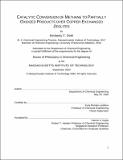Catalytic conversion of methane to partially oxidized products over copper-exchanged zeolites
Author(s)
Dinh, Kimberly T.(Kimberly Tam)
Download1241093340-MIT.pdf (2.652Mb)
Other Contributors
Massachusetts Institute of Technology. Department of Chemical Engineering.
Advisor
Yuriy Román-Leshkov.
Terms of use
Metadata
Show full item recordAbstract
The selective conversion of methane to liquid oxygenated compounds is a grand challenge in catalysis. Although natural gas can be processed industrially in large-scale facilities, new catalytic processes are required that economically directly convert methane to liquid products in small-scale units to exploit highly abundant but difficult-to-access gas reserves. Our group recently reported the first instance of a continuous, gas phase catalytic process for the direct conversion of methane to methanol using copper-exchanged zeolites by feeding only methane, water, and oxygen at 473 K. While this continuous system is an attractive route for the mild conversion of methane to value-added products, fundamental understanding of the reaction pathway and active site is necessary to engineer improved catalysts and an improved process. Thus, my thesis has investigated the fundamental kinetics and active site requirements for continuous partial methane oxidation and using this knowledge to design an improved process. First, a reaction pathway and a [Cu-O-Cu]²⁺ motif as the active site were identified for the selective catalytic conversion of methane to methanol. Kinetic analysis on copper-exchanged SSZ-13 zeolites across a range of Cu loadings and Al spatial distributions revealed the reaction pathway is initiated by rate-limiting C-H bond scission of methane. Water is kinetically inconsequential, but required for methanol desorption. Carbon dioxide is generated from the sequential over oxidation of partially oxidized intermediates and downstream methanol oxidation. Selective partial oxidation was achieved with catalyst samples of high Al content and moderate Cu content (Cu/cage<0.3) with high methane partial pressure in the presence of water. These learnings were used to design a tandem partial oxidation and alkylation process that effectively scavenges methanol to produce toluene by introducing an H-ZSM-5 catalyst and benzene co-feed. Benzene reacts with methanol over Brønsted acid sites, arresting methanol over oxidation and enabling 59% selectivity for partial oxidation products at 0.66% methane conversion. In total, these findings resulted in a process that can circumvent the thermodynamic selectivity-conversion limit for the direct partial oxidation of methane to methanol and provide a new avenue of research in product protection to increase methane conversion while maintaining high product selectivity over heterogeneous catalysts.
Description
Thesis: Ph. D., Massachusetts Institute of Technology, Department of Chemical Engineering, September, 2020 Cataloged from student-submitted PDF of thesis. Includes bibliographical references (pages 157-169).
Date issued
2020Department
Massachusetts Institute of Technology. Department of Chemical EngineeringPublisher
Massachusetts Institute of Technology
Keywords
Chemical Engineering.